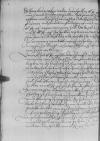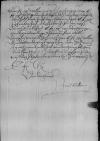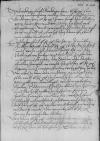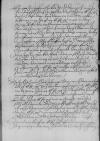E(wer) F(urstlichen) G(naden) zwen ⌊⌋, / der dattum XXIX December / unnd XVII Iulÿ, / hab ich wol empfanng(en), / unnd wie wol in sonnder der erst brief vast alt ist, / so volgt doch darauf, / sovil von notten, anntwurt. /
Erstlichen, sovil E(wer) F(urstliche) G(nade)n ⌊dochter⌋ unnd ⌊muetter⌋ halben betrifft, / hat E(wer) F(urstliche) G(nade)n selbs, / so hab ich auch vorlanngst / dem ⌊Albrecht Khonen⌋ / der notturfft geschriben / und bevolhen, / in sonnder mit heraus sennden der señora oder dochter, / sonnder zweifel, / er werde derselben E(wer) F(urstlichen) G(nade)n begeren, / auch meinem schreiben, / volg gethan haben. Wa aber in dem oder annderm manngel sein / solt, / will E(wer) F(urstlichen) G(nade)n ich mich hiemit unnderthanigklichen bewilliget / unnd angebottenn haben, / demnach ich in kurtz von hÿnnen / mit der hilf Gottes in ⌊Hispanien⌋ fur ain zeitlin zuraisen willens bin, / wil ich, sovil ⌊Albrecht⌋ nit volfuert, / alsdann noch fleiß thon, / auf das E(wer) F(urstliche) G(nade)n willen unnd bevelh on verzug volstreckht werdt. / Der vervolg soll E(wer) F(urstlichen) G(nade)n hernach unverhalten bleiben. /
Wie dann E(wer) F(urstlichen) G(nade)n mit wildbrad / unnd vischen / so reichlich / unnd wol versehen wasen, / also d(a)z E(wer) F(urstlichen) G(nade)n dem ⌊ertzbishove zu Toledo⌋ / nichts in  BCz 1595 p. 602 solhem bevor geben wolten, / derhalben E(wer) F(urstliche) G(nade)n mich unnd annder derselben lieb frundt / zuvor hidden by binding⌈[or]or hidden by binding⌉ offtern mal zu sich wunshten, / welhs ich dann furwar mit sonnderm frölichen gemuet / von E(wer) F(urstlichen) G(nade)n wegen vernomen hab. / Wolte Got, / d(a)z ich hidden by binding⌈[h]h hidden by binding⌉ möcht E(wer) F(urstliche) G(nade)n zu zeitten visitieren / und haim hidden by binding⌈[im]im hidden by binding⌉ suechen, / umb also die alte guette conntshaft zu ernewern / unnd lennger zuerhalten. / Es mag sich villeicht noch etwa seltzam shicken, / daz hidden by binding⌈[az]az hidden by binding⌉ wir zusamen komen. /
BCz 1595 p. 602 solhem bevor geben wolten, / derhalben E(wer) F(urstliche) G(nade)n mich unnd annder derselben lieb frundt / zuvor hidden by binding⌈[or]or hidden by binding⌉ offtern mal zu sich wunshten, / welhs ich dann furwar mit sonnderm frölichen gemuet / von E(wer) F(urstlichen) G(nade)n wegen vernomen hab. / Wolte Got, / d(a)z ich hidden by binding⌈[h]h hidden by binding⌉ möcht E(wer) F(urstliche) G(nade)n zu zeitten visitieren / und haim hidden by binding⌈[im]im hidden by binding⌉ suechen, / umb also die alte guette conntshaft zu ernewern / unnd lennger zuerhalten. / Es mag sich villeicht noch etwa seltzam shicken, / daz hidden by binding⌈[az]az hidden by binding⌉ wir zusamen komen. /
Veri(?)er so hat E(wer) F(urstliche) G(nade)n sonnders zweifel vor disem vernomen, / wie ich mich in den stanndt der ehe hidden by binding⌈[he]he hidden by binding⌉ begeben / unnd die hochtzeit shon vor dreÿen monaten hidden by binding⌈[aten]aten hidden by binding⌉ gehalten hab. / Hat mich also herr ⌊Barthlome Welser hidden by binding⌈[lser]lser hidden by binding⌉⌋ mit seiner eltesten ⌊dochter⌋ versehen. / Got ver[...] hidden by binding⌈[...][...] hidden by binding⌉ mir zu solhem saligen stanndt, / was mir zu seel, / leib, / eer / unnd guet nutz seÿ, amen. / Der hidden by binding⌈[r]r hidden by binding⌉ halben, wie E(wer) F(urstliche) G(nade)n sich genedigklichen zuer innern wissen, / das ain guetter hausman bilig hidden by binding⌈[ig]ig hidden by binding⌉ shuldig ist / sein haus mit guettem hausradt / unnd klaidung zuversehen, / so hat mich mein liebe ⌊hausfraw⌋ gebetten, ir ain guette, reichliche, praitte deckhin, von madrin shwenntzen gemacht hidden by binding⌈[ht]ht hidden by binding⌉, auf ain peet gehörig, / bestellen / unnd kauffen solt hidden by binding⌈[t]t hidden by binding⌉. Dergleichen wolt ich fur mich selbs / auch geren ain guet pollnish madrins pellzlin, / in mass hidden by binding⌈[s]s hidden by binding⌉ unnd von der guette, / wie E(wer) F(urstliche) G(nade)n dem ⌊Ulrichen  BCz 1595 p. 603 Ehinger⌋ zuegesannt haben, / unnd demnach man in sonnder solh ding in ⌊Pollen⌋, / da sich dann E(wer) F(urstlichen) G(nade)n täglich befinden, / bas dann an anndern ortten / bekomen mag. / So ist an E(wer) F(urstliche) G(nade)n mein unnderthanig bitt, / die wellen von meintwegen / sovil bemuet sein / unnd durch ainen derselben unnderthanen, / der solher ding verstenndig, / meiner lieben ⌊hausfraw⌋ / unnd mir zu sonnderm gefallenn / mit erstem / solhs kauffen lassen. / Was solhs kossten wirt, / hab ich hie mit der ⌊Fugger⌋ factor, ⌊Chonrat Mair⌋ genannt, / abgeredt. / Der shreibt dem ⌊Jorg Heglin⌋ gen ⌊Krackhaw⌋, / das er solhs zu danckh betzalen. / Dem mag es auch uber anntwurt werden. / Der wirt mirs alsdann wol zuezushickhen wissen. / E(wer) F(urstlichen) G(nade)n wellen also gemuet sein, / will ich allezeit in aller unnderthanigkait mit allem vleiß verdiennen. /
BCz 1595 p. 603 Ehinger⌋ zuegesannt haben, / unnd demnach man in sonnder solh ding in ⌊Pollen⌋, / da sich dann E(wer) F(urstlichen) G(nade)n täglich befinden, / bas dann an anndern ortten / bekomen mag. / So ist an E(wer) F(urstliche) G(nade)n mein unnderthanig bitt, / die wellen von meintwegen / sovil bemuet sein / unnd durch ainen derselben unnderthanen, / der solher ding verstenndig, / meiner lieben ⌊hausfraw⌋ / unnd mir zu sonnderm gefallenn / mit erstem / solhs kauffen lassen. / Was solhs kossten wirt, / hab ich hie mit der ⌊Fugger⌋ factor, ⌊Chonrat Mair⌋ genannt, / abgeredt. / Der shreibt dem ⌊Jorg Heglin⌋ gen ⌊Krackhaw⌋, / das er solhs zu danckh betzalen. / Dem mag es auch uber anntwurt werden. / Der wirt mirs alsdann wol zuezushickhen wissen. / E(wer) F(urstlichen) G(nade)n wellen also gemuet sein, / will ich allezeit in aller unnderthanigkait mit allem vleiß verdiennen. /
So hab ich auch die zehen guldin / umb das matzis öll, so E(wer) F(urstliche) G(nade)n ich vorlanngest gesannt, / empf(ange)n. Wolte geren, das es E(wer) F(urstlichen) G(nade)n zu derselben lanngkwirigen gesundt wol diennte. / Möchte auch wol leiden, / das E(wer) F(urstlichen) G(nade)n mir antzaigte, / warzue solh öll diennte / oder was krafft es hette, / unnd ob es zu dem / auch furderlich unnd hilflich seÿ, / davon E(wer) F(urstliche) G(nade)n mir vorlanngst gesagt hat, / ob ich das mit der zeit auch brauchen muest. /
Hiemit am brief an E(wer) F(urstliche) G(nade)n ist mir verganngen tag / aus ⌊Ÿnndia⌋ von ⌊Hernando Cortes⌋ zuekhomen. /  BCz 1595 p. 604 Hab seider noch frisher brief von im, / deß auszug E(wer) F(urstlichen) G(nade)n ich hiemit zuesennde. / Die newen zeittung er shreibt, / daraus zuvornemen, / ist ain tapfer wonderlich mann, / aber ⌊ir m(aieste)t⌋ waist nit hidden by binding⌈[t]t hidden by binding⌉, was an im hat. / Er mueß seiner getrewen dienst[...] hidden by binding⌈[...][...] hidden by binding⌉, wie ich unnd annder auch, entgelten, / bis zu seiner zeit, / das ain mal die warhait erkennen hidden by binding⌈[en]en hidden by binding⌉ wirt. / Das puntlin brief, so E(wer) F(urstliche) G(nade)n an gemelten ⌊Herna(ndo) Corttes⌋ mir zuegesannt, / hab hidden by binding⌈[ab]ab hidden by binding⌉ ich vorlanngst in ⌊Spanien⌋ gesannt, / also das i[...] hidden by binding⌈[...][...] hidden by binding⌉ hoff / im wol zuekomen werdt. /
BCz 1595 p. 604 Hab seider noch frisher brief von im, / deß auszug E(wer) F(urstlichen) G(nade)n ich hiemit zuesennde. / Die newen zeittung er shreibt, / daraus zuvornemen, / ist ain tapfer wonderlich mann, / aber ⌊ir m(aieste)t⌋ waist nit hidden by binding⌈[t]t hidden by binding⌉, was an im hat. / Er mueß seiner getrewen dienst[...] hidden by binding⌈[...][...] hidden by binding⌉, wie ich unnd annder auch, entgelten, / bis zu seiner zeit, / das ain mal die warhait erkennen hidden by binding⌈[en]en hidden by binding⌉ wirt. / Das puntlin brief, so E(wer) F(urstliche) G(nade)n an gemelten ⌊Herna(ndo) Corttes⌋ mir zuegesannt, / hab hidden by binding⌈[ab]ab hidden by binding⌉ ich vorlanngst in ⌊Spanien⌋ gesannt, / also das i[...] hidden by binding⌈[...][...] hidden by binding⌉ hoff / im wol zuekomen werdt. /
Hiemit auszug ains briefs von ⌊Vinedig⌋, / an meinen paper damaged⌈[inen]inen paper damaged⌉ ⌊herrn⌋ geshriben, / darinnen E(wer) F(urstliche) G(nade)n sechen werden, / was herr ⌊Anndre Doria⌋ ze ⌊Coron⌋ ausgericht hat. / Aber der friden, / so zwishen dem paper damaged⌈[m]m paper damaged⌉ ⌊romishen kunig⌋ / unnd ⌊Turgken⌋ solt beshlossenn werden, / wil meins achtens / noch nit recht von stat geen. / Das welh mir auch von wegen unsers guetten frunds ⌊Corneli(us) Sceper(us)⌋ nicht lieb. Ist demnach ⌊er⌋, wie E(wer) F(urstliche) G(nade)n wissen, / in die ⌊Turcken paper damaged⌈[n]n paper damaged⌉⌋ gesannt, / unnd noch nicht heraus komen ist. / Man hat auch seider seins abshids kain wissen von im paper damaged⌈[m]m paper damaged⌉. Wolte furwar geren seinthalben wissen haben, wie es doch ein gestalt umb in het. / So bald ich aber w(a)z erfar, / wie es ain gestalt umb in hat, will E(wer) F(urstliche) G(nade)n ich solhs auch nit verhalten. /  BCz 1595 p. 695 Ewr F(urstlichen) G(nade)n wellen mir auch antzaigen, / wa E(wer) F(urstlichen) G(nade)n sich yeder zeit befinden werden, / auf d(a)z, wa ich new zeittung / oder annders E(wer) F(urstliche) G(nade)n zushreiben hab, / dieselben zufinden wiß, / dann ich allezeit E(wer) F(urstliche) G(nade)n unnderthaniger unnd guet williger dienner sein will. / Dergleichen will ich mich von E(wer) F(urstliche) G(nade)n aller gnaden unnd gunst versehen, / der ich mich hiemit / unnd alle zeit unnderthanigklichen bevelhen thue. /
BCz 1595 p. 695 Ewr F(urstlichen) G(nade)n wellen mir auch antzaigen, / wa E(wer) F(urstlichen) G(nade)n sich yeder zeit befinden werden, / auf d(a)z, wa ich new zeittung / oder annders E(wer) F(urstliche) G(nade)n zushreiben hab, / dieselben zufinden wiß, / dann ich allezeit E(wer) F(urstliche) G(nade)n unnderthaniger unnd guet williger dienner sein will. / Dergleichen will ich mich von E(wer) F(urstliche) G(nade)n aller gnaden unnd gunst versehen, / der ich mich hiemit / unnd alle zeit unnderthanigklichen bevelhen thue. /
 BCz 1595 p. 602 solhem bevor geben wolten, / derhalben E(wer) F(urstliche) G(nade)n mich unnd annder derselben lieb frundt / zuvor hidden by binding⌈[or]or hidden by binding⌉ offtern mal zu sich wunshten, / welhs ich dann furwar mit sonnderm frölichen gemuet / von E(wer) F(urstlichen) G(nade)n wegen vernomen hab. / Wolte Got, / d(a)z ich hidden by binding⌈[h]h hidden by binding⌉ möcht E(wer) F(urstliche) G(nade)n zu zeitten visitieren / und haim hidden by binding⌈[im]im hidden by binding⌉ suechen, / umb also die alte guette conntshaft zu ernewern / unnd lennger zuerhalten. / Es mag sich villeicht noch etwa seltzam shicken, / daz hidden by binding⌈[az]az hidden by binding⌉ wir zusamen komen. /
BCz 1595 p. 602 solhem bevor geben wolten, / derhalben E(wer) F(urstliche) G(nade)n mich unnd annder derselben lieb frundt / zuvor hidden by binding⌈[or]or hidden by binding⌉ offtern mal zu sich wunshten, / welhs ich dann furwar mit sonnderm frölichen gemuet / von E(wer) F(urstlichen) G(nade)n wegen vernomen hab. / Wolte Got, / d(a)z ich hidden by binding⌈[h]h hidden by binding⌉ möcht E(wer) F(urstliche) G(nade)n zu zeitten visitieren / und haim hidden by binding⌈[im]im hidden by binding⌉ suechen, / umb also die alte guette conntshaft zu ernewern / unnd lennger zuerhalten. / Es mag sich villeicht noch etwa seltzam shicken, / daz hidden by binding⌈[az]az hidden by binding⌉ wir zusamen komen. /
 BCz 1595 p. 603 Ehinger
BCz 1595 p. 603 Ehinger BCz 1595 p. 604 Hab seider noch frisher brief von im, / deß auszug E(wer) F(urstlichen) G(nade)n ich hiemit zuesennde. / Die newen zeittung er shreibt, / daraus zuvornemen, / ist ain tapfer wonderlich mann, / aber
BCz 1595 p. 604 Hab seider noch frisher brief von im, / deß auszug E(wer) F(urstlichen) G(nade)n ich hiemit zuesennde. / Die newen zeittung er shreibt, / daraus zuvornemen, / ist ain tapfer wonderlich mann, / aber  BCz 1595 p. 695 Ewr F(urstlichen) G(nade)n wellen mir auch antzaigen, / wa E(wer) F(urstlichen) G(nade)n sich yeder zeit befinden werden, / auf d(a)z, wa ich new zeittung / oder annders E(wer) F(urstliche) G(nade)n zushreiben hab, / dieselben zufinden wiß, / dann ich allezeit E(wer) F(urstliche) G(nade)n unnderthaniger unnd guet williger dienner sein will. / Dergleichen will ich mich von E(wer) F(urstliche) G(nade)n aller gnaden unnd gunst versehen, / der ich mich hiemit / unnd alle zeit unnderthanigklichen bevelhen thue. /
BCz 1595 p. 695 Ewr F(urstlichen) G(nade)n wellen mir auch antzaigen, / wa E(wer) F(urstlichen) G(nade)n sich yeder zeit befinden werden, / auf d(a)z, wa ich new zeittung / oder annders E(wer) F(urstliche) G(nade)n zushreiben hab, / dieselben zufinden wiß, / dann ich allezeit E(wer) F(urstliche) G(nade)n unnderthaniger unnd guet williger dienner sein will. / Dergleichen will ich mich von E(wer) F(urstliche) G(nade)n aller gnaden unnd gunst versehen, / der ich mich hiemit / unnd alle zeit unnderthanigklichen bevelhen thue. /




